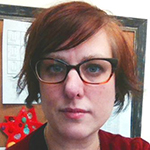Director of Strategic Client Solutions, Aries Systems
 Please tell us a bit about yourself (e.g. hometown, current locale, course of study).
Please tell us a bit about yourself (e.g. hometown, current locale, course of study).
I grew up in Indiana and attended the University of Wisconsin – Madison, where I graduated with my B.A. in English Literature and Art History. Despite my Midwestern roots, I have found my true home on the East Coast. I spent several years in Washington, DC, where I got my start in scholarly publishing and received my MBA from Johns Hopkins University. I now lead a ridiculously conventional (but very happy) existence in a small town 35 miles west of Boston with my husband, twin boys, and dog.
Describe some of your current responsibilities, and what type of organization you belong to.
I am currently the Director of Strategic Client Solutions at Aries Systems Corporation, a software company providing the online workflow systems, Editorial Manager and ProduXion Manager. In this position I am responsible for our global client services strategy and staff. I work directly with clients and indirectly through my team to create and execute successful training and implementation programs for new customers, as well as ongoing support strategies. I also head up select strategic development projects within the company. Because the STM publishing environment and requirements are constantly changing, my job is never static. I can honestly say I am never bored!
What was your first scholarly publishing role? How did you get that job? What path led to your current position?
My first scholarly publishing position was as an Editorial Assistant for the Journal of Neuroscience. I had no idea the world of scholarly publishing existed until the employment recruiter with whom I was working told me she would like to fax (yes, fax) my resume to the Society for Neuroscience because I had an English degree and they needed someone in their publications department. Within weeks of starting at the Journal, I knew I had found my career. Over the next several years I migrated to the production side of the workflow and held journal publishing positions with the American Diabetes Association, the American Society of Plant Biologists, and the National Academy of Sciences. When I left Washington, DC, I made the leap from societies to the commercial side of the business and began working at Aries Systems in 2005.
If there was a pivotal moment or key person in your career development, please describe briefly.
I was extremely fortunate early in my career to work with and for many smart and successful people in our industry, who have served as my mentors. They included me in conversations above my head and invited me into meetings as an observer – to learn. In exchange I tried never to turn down an extra assignment or an opportunity in general.
What tools, web sites and organizations do you find most valuable for your career development?
Throughout my career I have relied upon the Society for Scholarly Publishing and the Council of Science Editors for information about emerging trends, new opportunities, and networking. A few years after starting in scholarly publishing, I attended the AAP/PSP Journals Bootcamp and found it to be an excellent and comprehensive learning experience. I try to attend three or more scholarly publishing conferences per year, read relevant blogs like the Scholarly Kitchen, and talk to a lot of really smart people about what is currently holding their interest and what they see on the horizon for our industry.
What advice would you give to people interested in a career in scholarly communications?
I would recommend people get involved by becoming members of professional societies (such as CSE, SSP, ISMTE, etc.). After becoming a member and attending society conferences, look for volunteer opportunities within the organizations. It’s surprising how much can be gained by becoming an active member of a committee that allows you to brainstorm education or communication strategies with industry peers that may have totally different perspectives. Engage with the latest technology; there are new tools being developed constantly. Don’t be afraid to ask for new responsibilities, make suggestions, ask for development opportunities, and even propose a new job that meets a growing need within your organization.

